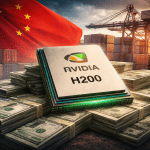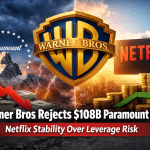Nvidia CEO Jensen Huang offloads an additional $12.94 million worth of shares.
Taipei, Taiwan – Jensen Huang, the charismatic and visionary co-founder and CEO of Nvidia (NASDAQ: NVDA), whose celebrity net worth has skyrocketed in tandem with his company's meteoric rise, has been in the spotlight recently, not just for Nvidia's groundbreaking AI advancements, but also for his personal financial moves.
While many are currently discussing the recent article on the top 10 celeb crypto holdings, Huang's focus remains on his vast traditional stock portfolio. The latest reports confirm he sold an additional $12.94 million worth of Nvidia shares on Friday, July 18th, according to a filing with the U.S. Securities and Exchange Commission (SEC).
This transaction, involving 75,000 shares, is part of a meticulously pre-planned trading arrangement (known as a Rule 10b5-1 plan) that has been in effect since March 2025, allowing Huang to divest up to 6 million shares over time.
Don’t be alarmed by Jensen Huang’s recent share sales—these transactions are part of a pre-arranged 10b5-1 plan, essentially a financial autopilot that lets executives manage personal wealth and diversify holdings without triggering insider trading concerns. According to SEC filings, Huang has now sold approximately $190 million in stock under this plan, including $12.94 million just this week.
The timing coincided with President Donald Trump’s surprising comment that he once considered breaking up Nvidia—a move he later dismissed as unworkable due to the company’s dominance in AI hardware. While the headlines stirred speculation, it’s worth noting that Huang remains Nvidia’s largest individual shareholder, signaling continued confidence and long-term commitment to the company he helped build into a global powerhouse.
Jensen Huang’s Nvidia Shareholdings and 2025 Insider Stock Sales
As of July 23, 2025, Nvidia CEO Jensen Huang holds 74,123,225 shares directly and indirectly controls an estimated 783.4 million more through family trusts and affiliated entities—bringing his total beneficial ownership to approximately 857.5 million shares, or 3.5% of Nvidia’s total shares outstanding (SEC Form 4 filing – July 23, 2025). This makes Huang the company’s largest individual shareholder.
Huang’s recent stock sales were executed under a Rule 10b5‑1 trading plan, a legal framework created by the SEC that allows corporate insiders to sell predetermined amounts of stock at set times, even if they later possess material nonpublic information (SEC Rule 10b5-1 Explainer). Huang adopted this plan on March 20, 2025, to avoid any appearance of insider trading as Nvidia’s market cap surged past $3 trillion.
According to official filings and verified media coverage in Barron’s and Investing.com, Huang has sold the following Nvidia shares this year:
| Date | Shares Sold | Avg. Sale Price | Estimated Proceeds | Source |
|---|---|---|---|---|
| June 20–23, 2025 | 100,000 | $144.04 | $14.4 million | SEC Form 4 |
| June 24–26, 2025 | 200,000 | $152.33 | $30.5 million | Barron’s |
| June 27, 2025 | 225,000 | $156.27 | $35.1 million | SEC Form 4 |
| July 2, 2025 | 225,000 | $158.02 | $35.5 million | SEC Form 4 |
| July 8–10, 2025 | 225,000 | $161.90 | $36.4 million | TOI |
| July 16–18, 2025 | 225,000 | $172.00 | $38.7 million | SEC Form 4 |
| July 18, 2025 | 75,000 | $172.00 | $12.9 million | Finance Monthly |
| July 21–23, 2025 | 200,121 | $169.00 | $33.8 million | Investing.com |
The Nvidia Phenomenon: From Gaming to Global AI Dominance
Huang's share sales are unfolding during an unprecedented era for Nvidia. What started as a niche company focused on graphics cards for gamers has blossomed into the world's most valuable enterprise, with a market capitalization exceeding an astonishing $4 trillion. This meteoric rise is almost entirely fueled by the insatiable global demand for artificial intelligence (AI) and the high-performance GPUs that are the very backbone of large language models and other AI applications.
Even former Bank of England governor and Canadian PM Mark Carney has cited Nvidia’s ascent as a symbol of the shifting global economy, where technological infrastructure and AI capabilities are now seen as the defining assets of national power and corporate dominance.
Nvidia's stock performance has been nothing short of spectacular, soaring over 1,400% in the past five years. This incredible growth has, of course, significantly boosted Huang's personal net worth, cementing his status as one of the world's wealthiest individuals. For a founder who has dedicated decades to building this empire, a planned diversification of assets is a natural and prudent financial step.
Navigating Geopolitics: The Return to China
Beyond financial results, Nvidia is making key strategic moves—most notably, announcing plans to resume sales of its H20 chips to China. This is a significant shift following earlier U.S. export restrictions. The Trump administration has now assured Nvidia that export licenses for the China-specific, U.S.-compliant chips will be granted.
“The U.S. government has assured NVIDIA that licenses will be granted, and NVIDIA hopes to start deliveries soon,” the company said Tuesday. CEO Jensen Huang has also been meeting with Chinese officials and attending events in Beijing to support the effort.
He's been vocal about the importance of American companies competing fairly in China's dynamic and innovative market, even expressing a long-term desire to sell even more advanced chips there. This push comes amidst growing competition in the AI chip market, as evidenced by Nvidia challenger FuriosaAI securing its first major customer, LG AI Research, for its cutting-edge AI accelerator, the Renegade processor as reported by Bloomberg, July 22, 2025.
The resumption of H20 chip sales is a major win for Nvidia, with China historically making up 15.5% of its business. Earlier export curbs slashed its market share there by nearly half, but reopening this pipeline highlights Nvidia’s strategic and diplomatic strength.
Jensen Huang: A Leader's Perspective
For those who follow Jensen Huang, his recent actions fit squarely within his established pattern of transparent leadership and strategic foresight. He's not just a CEO; he's a true industry pioneer whose vision has consistently been ahead of the curve. His personal share sales, while significant in dollar terms, are a standard part of wealth management for someone of his stature, especially given the monumental increase in Nvidia's valuation. They certainly don't signal any wavering confidence in the company's future.
Nvidia's journey continues to be one of relentless innovation, strategic agility, and a profound impact on the technological landscape. With AI adoption accelerating globally and key markets like China reopening, the company's trajectory remains compelling.
Explore More Celebrity Fortunes
Curious about how your favorite stars built their wealth? Check out the full collection of celebrity fortunes in our Finance Monthly Net Worth section. From Paris Jackson’s growing empire to the career earnings of Jeff Lynne, MC Hammer, Joe Pesci, Bob Geldof, and many more, discover how icons from music, film, and pop culture turned fame into financial power.
Jensen Huang Frequently Asked Questions (FAQ)
Q1: Why is Jensen Huang selling Nvidia shares now?
A1: Jensen Huang's recent share sales are part of a pre-planned trading arrangement called a 10b5-1 plan. These plans are set up in advance to allow executives to sell shares at predetermined times, regardless of any new, non-public information. This is a common and transparent practice for high-level executives to manage their personal finances, diversify their wealth, and avoid accusations of insider trading. You can often find details of these plans in company disclosures to the SEC.
Q2: Do these sales mean Jensen Huang is losing confidence in Nvidia?
A2: No, quite the opposite. These sales are a routine part of wealth management for executives of highly valuable companies. Jensen Huang remains Nvidia's largest individual shareholder, holding over 900 million shares. Given Nvidia's incredible growth and his significant personal stake, it's a natural financial move to diversify a portion of his assets. His active involvement in the company's strategic decisions and his public statements continue to reflect strong confidence in Nvidia's future.
Q3: What is a 10b5-1 plan?
A3: A 10b5-1 plan is a pre-arranged trading plan that allows corporate insiders (like CEOs) to buy or sell company stock at a future date. The plan must be set up when the insider does not possess material non-public information. This legal framework protects executives from insider trading allegations by ensuring that the trades are executed based on a pre-determined schedule, not on privileged information. These plans are filed with the SEC and are publicly accessible.
Q4: How much has Jensen Huang sold in total recently?
A4: Since beginning his current 10b5-1 plan last month, Jensen Huang has sold approximately 1.2 million shares, totaling roughly $190 million. The latest sale on Friday, July 18th, was for 75,000 shares, valued at about $12.94 million, as reported in SEC filings.
Q5: What is the significance of Nvidia resuming H20 chip sales to China?
A5: This is a major strategic development for Nvidia. China is a vital market, historically contributing around 15.5% of Nvidia's revenue. Previous U.S. export restrictions on advanced chips had impacted Nvidia's ability to compete there. The resumption of H20 chip sales, with assurances of export license approvals from the U.S. government, reopens a significant revenue stream and allows Nvidia to strengthen its presence in a key global AI market.
Q6: Why is Nvidia's market capitalization so high?
A6: Nvidia's market capitalization has soared past $4 trillion primarily due to the explosive demand for Artificial Intelligence (AI) and the company's dominant position in manufacturing the high-performance Graphics Processing Units (GPUs) that are essential for AI development, particularly for large language models. Nvidia's technology is at the forefront of the AI revolution, making its products indispensable for tech companies worldwide.
Q7: What is Jensen Huang's role beyond CEO at Nvidia?
A7: Jensen Huang is not just the CEO; he is also the co-founder of Nvidia. He's widely recognized as a visionary leader and a pioneer in the computing industry, particularly in the fields of graphics processing and artificial intelligence. He plays a very hands-on role in product development, strategic direction, and public representation of the company. His long history and deep understanding of the industry are central to Nvidia's success.
More from Finance Monthly: Decoding Celebrity Investments, from Crypto to Retirement Security
Beyond the Red Carpet: Top 10 Celebrity Crypto Holdings and What it Means for You
Do Hollywood Stars Have Pensions? Why Fame Can't Buy Retirement Security














